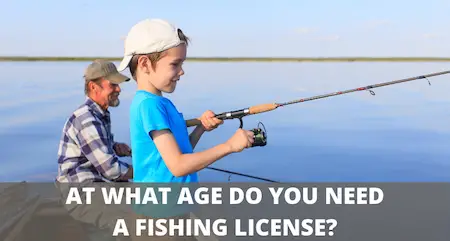How Old Do You Have To Be To Get A Fishing License? (Explained For All States)
UPDATED 03 NOVEMBER 2023
by Robert Ceran
Most adults are required to buy a fishing license in the majority of states, but what if you’re a youth or a teenager?
Are you allowed to fish without a license in that case, and at what age does that change?
In this article we’ll cover the age requirements for getting a fishing license in all 50 states, and we’ll also discuss which states allow senior citizens to fish without a license.

At what age do you need a fishing license?
In most states you need a fishing license at the age of 16 or above, but in some states the age requirement for getting a fishing license is different, ranging from age 10 in Arizona, to age 18 in Indiana.
Since the exact age at which you need to get a fishing license depends on each state, we put together a table listing the minimum age requirements for all 50 states:
| State | Minimum age at which a fishing license is required |
|---|---|
| Alabama | 16 |
| Alaska | 18 |
| Arizona | 10 |
| Arkansas | 16 |
| California | 16 |
| Colorado | 16 |
| Connecticut | 16 |
| Delaware | 16 |
| Florida | 16 |
| Georgia | 16 |
| Hawaii | No license required for recreational saltwater fishing |
| Idaho | 14 |
| Illinois | 16 |
| Indiana | 18 |
| Iowa | 16 |
| Kansas | 16 |
| Kentucky | 12 |
| Louisiana | 16 |
| Maine | 16 |
| Maryland | 16 |
| Massachusetts | 15 |
| Michigan | 17 |
| Minnesota | 16 |
| Mississippi | 16 |
| Missouri | 16 |
| Montana | 12 |
| Nebraska | 16 |
| Nevada | 12 |
| New Hampshire | 16 |
| New Jersey | 16 |
| New Mexico | 12 |
| New York | 16 |
| North Carolina | 16 |
| North Dakota | 16 |
| Ohio | 16 |
| Oklahoma | 16 |
| Oregon | 12 |
| Pennsylvania | 16 |
| Rhode Island | 16 |
| South Carolina | 16 |
| South Dakota | 16 |
| Tennessee | 13 |
| Texas | 17 |
| Utah | 12 |
| Vermont | 15 |
| Virginia | 16 |
| Washington | 15 |
| West Virginia | 15 |
| Wisconsin | 16 |
| Wyoming | 14 |
The table above shows the minimum age at which you need to get a fishing license in each state.
If you belong in an age group that needs to purchase a license, check out our article on how much does it cost to get a fishing license, which covers the pricing of all 50 states.
How old can you be without having to get a fishing license?
If your state requires you to have a fishing license at the age of 16, you can fish without a license until the day before your 16th birthday.
To determine until what age you are exempt from a fishing license in your state specifically, refer to the table above, which shows the minimum age at which you need to get a license for every state.
If you fall below the required minimum age for your state, that means you can fish without a license. For more details on this, check out our article can you fish without a license?
If this applies to you, make sure you carry a proof of age at all times when you go fishing.
Also keep in mind that you might need a separate permit for catching certain species (such as snook and tarpon in Florida), and that bag and size limits can still apply to you.
Age requirements for residents vs non-residents
The age requirements for fishing without a license can be different for residents and non-residents in the same state.
In some states, such as Florida, the minimum age is the same for both groups, but in other states, such as Alaska, the minimum age is 18 for residents, but 15 for non-residents.
For more information on the regulations in Florida, check out our guide getting a fishing license in Florida.
If there is a difference between residents and non-residents, this usually means that the non-residents are required to buy a fishing license at a younger age than residents.
In addition to this difference, non-resident licenses are also usually more expensive. So if you have guests from other states, and want to go fishing with them, this is something you need to be aware of.
Finally, you should also be aware that every state defines a resident in a slightly different way.
For example, in Pennsylvania, you count as a resident, if has been your main residence for at least 30 days, while in Texas you count as a resident if you have lived there for at least 6 months.
Exceptions for US military personnel
If you’re a youth that’s technically not a resident of the state that you want to fish in, you could still qualify as a resident if your parents belong to the US armed forces, and are on active duty in the state in question.
Many states count actively deployed military personnel and their household members as residents.
What age groups do not require a fishing license?
All 50 states allow youths to fish without a license, and some states also allow seniors to fish without a license.
‘Youths’ are usually defined as anyone under the age of 16, but the age requirement differs from state to state.
You can refer to our table above to check the age for your state, and you can also check the website of the Fish & Game department of your state.
Seniors are usually defined as anyone of age 65 or above, but not every state allows this age group to fish without a license.
For example, in Florida seniors above 64 are exempt from having to get a fishing license, but in California this is not the case.
California seniors over 65 can get a discounted license, but they still need to buy a valid license in order to fish.
List of states that allow seniors to fish without a license (or with a free one)
The following states allow senior citizens to fish for free:
- Alabama: no fishing license required over 64
- Alaska: free fishing permit available over 59
- Connecticut: free fishing permit available over 64
- Delaware: no fishing license required over 64
- Florida: no fishing license required over 64
- Georgia: free fishing permit available over 64
- Iowa: free fishing permit available for low-income seniors over 64
- Massachusetts: free fishing permit available over 69, and free saltwater fishing permit available over 59
- Missouri: free fishing permit available over 64
- New Mexico: free fishing permit available over 69
- Rhode Island: free fishing permit available over 64
- Vermont: free fishing permit available over 69
- Virginia: free saltwater fishing permit available over 64
- Wyoming: free fishing permit available over 64 (but only if you’ve been a Wyoming resident for at least 30 years)
So if you’re wondering if you need a fishing license at the age of 65, the answer depends on the state you’re living in.
But even if your state doesn’t offer free fishing privileges to senior citizens, you should know that most other states offer deeply discounted licenses to seniors (such as the $10.50 lifetime fishing/hunting license offered by Arkansas to residents over 64).
So make sure to check what discounts are available in your state specifically.
Similarly to the situation with youths, it’s important to keep in mind that states that allow senior citizens to fish for free only offer this privilege to their residents.
And also note that every state defines a resident in a slightly different way, so you need to check the details of the regulations for your own state.
Conclusion
While getting a fishing license is often viewed as a hassle, it actually provides important benefits to every angler.
Not only does the cost of licensing help pay for important conservation efforts, such as habitat preservation, biological research, as well as the restocking of heavily fished species, but it also supports education campaigns that raise awareness on the importance of taking care of our natural resources.
So by purchasing a fishing license, you’re actually helping to preserve the fishing resources of your state for generations to come.
And what could be better than going fishing in your favorite lakes and rivers with your grandchildren, and knowing that they’ll be able to do the same with their grand kids?
